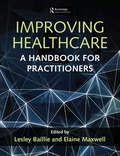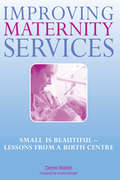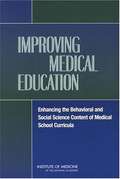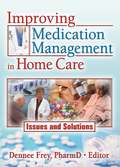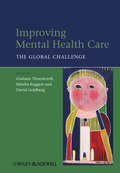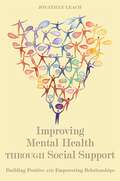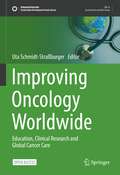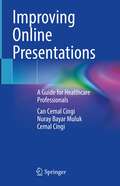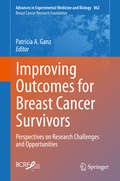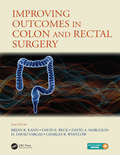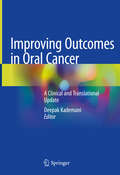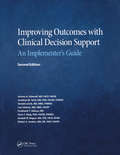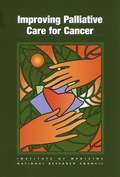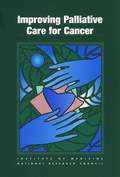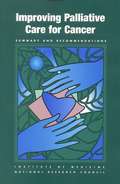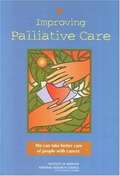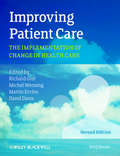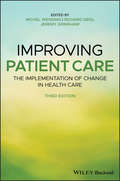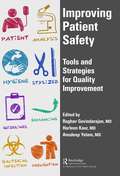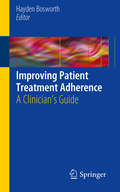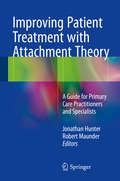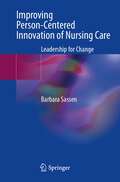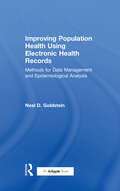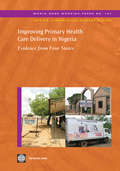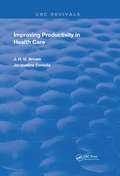- Table View
- List View
Improving Healthcare: A Handbook for Practitioners
by Lesley Baillie Elaine MaxwellGood intentions to do our best in healthcare are not enough. Healthcare professionals need to know how to close the gap between best evidence and practice, by understanding and applying quality improvement principles and processes. Improving Healthcare is a practical guide, providing healthcare staff with the knowledge and skills that enable them to implement, evaluate and disseminate a quality improvement project in their own workplace. With a comprehensive coverage, chapters cover the history, selection and application of quality improvement philosophies and methods in clinical healthcare at team, unit, organisational and system levels. The book also considers social processes of implementation as well as technical aspects of measuring and improving quality. As an essential guide for healthcare practitioners at any level who are new to service improvement, Improving Healthcare includes practical examples and case studies of healthcare improvements that illustrate the concepts discussed.
Improving Maternity Services: The Epidemiologically Based Needs Assessment Reviews, Vol 2
by Sheila Kitzinger Denis Walsh Norman EllisThis title includes Foreword by Sheila Kitzinger, Writer, Researcher, Activist and Honorary Professor, Wolfson School of Health Sciences, Thames Valley University. Birth centres are suitable for every woman whose birth is straightforward, which accounts for around 75 per cent of all women. This inspirational guide shows how small scale maternity provision has a profound clinical and organisational advantage over large scale hospital provision, including saving of time and money by reducing intervention rates. It presents the thoughts and feelings of midwives and patients and how both enjoy the humane and compassionate care of the birth centre ethos. The book is invaluable for midwives, obstetricians, doulas, maternity care assistants and maternity service planners and managers. It also provides enlightening information for general practitioners and other health and social care professionals, maternity service users groups and academics with an interest in midwifery and health services. "What birth centres do best is simply providing humane childbirth care. There are no high tech gadgetry, doctors or dramatic stories of childbirth rescues that make it into the media. Yet 'miracles' happen inside their walls every day as women have their babies after normal labours and births. Until now, there have been very few books detailing what happens in birth centres so that women and childbirth professionals can be introduced to an alternative beyond the large hospital model. This book provides a window in on the birth centre model and there are some exciting things to find there about childbirth care in the 21st century." - Denis Walsh, in the Preface. "Denis Walsh has one of the most incisive, analytical and brilliant minds in nursing and midwifery research today. He demonstrates the difference between a quality environment for birth where a woman can create her own 'nest', and a technocratic, bureaucratically controlled, highly medicalised and risk-oriented birth culture dominated by the clock, which is most women's experience today." - Sheila Kitzinger, in the Foreword.
Improving Medical Education: Enhancing the Behavioral and Social Science Content of Medical School Curricula
by Institute of Medicine of the National AcademiesRoughly half of all deaths in the United States are linked to behavioral and social factors. The leading causes of preventable death and disease in the United States are smoking, sedentary lifestyle, along with poor dietary habits, and alcohol consumption. To make measurable improvements in the health of Americans, physicians must be equipped with the knowledge and skills from the behavioral and social sciences needed to recognize, understand, and effectively respond to patients as individuals, not just to their symptoms. What are medical schools teaching students about the behavioral and social sciences? In the report, the committee concluded that there is inadequate information available to sufficiently describe behavioral and social science curriculum content, teaching techniques, and assessment methodologies in U.S. medical schools and recommends development of a new national behavioral and social science database. The committee also recommended that the National Board of Medical Examiners ensure that the U.S. Medical Licensing Examination adequately cover the behavioral and social science subject matter recommended in this report.
Improving Medication Management in Home Care: Issues and Solutions
by Dennee FreyHelp stop the widespread problem of medication errors among the elderly The problem of medication errors among the elderly is widespread. Improving Medication Management in Home Care: Issues and Solutions tackles this tough issue by closely examining the challenges faced in preventing medication errors in home and community care program settings and putting forth effective solutions to better manage medication use. Respected experts discuss the unique role of the pharmacist in improving patient safety, presenting a comprehensive collection of evidence-based studies featuring national and international viewpoints, cutting-edge interventions, and cost-effective procedures that address medication problems in older adults.Polypharmacy is the term used for patients receiving too many medications for a specific treatment. The implications for drug-drug interactions can be dangerous for the unaware patient. Improving Medication Management in Home Care: Issues and Solutions focuses on several different effective management programs and examines each in detail, completely explaining the positive-and negative-results. This hands-on practical information is useful for all professionals and field providers working with older adults and their medication concerns. The book also provides valuable lessons through the experiences of national home health leaders in various settings-hospital-based, rural, large or small, etc., as well as community-based programs for dually eligable older adults. The book is extensively referenced and includes an abundance of clear, helpful tables, figures, and Web resources.Improving Medication Management in Home Care: Issues and Solutions explores: developing computerized risk assessment screenings implementing pharmacist-centered interventions improving transitional care from hospital to home the Prescription Intervention and Lifelong Learning (PILL) program Medication Therapy Management Services a quality-improvement project to reduce falls and improve medication management outcome-based quality improvement for patient safety intern programs that can provide cost-effective consultant servicesImproving Medication Management in Home Care: Issues and Solutions is essential reading for home health care administrators, clinicians, managers, pharmacists, physicians, educators, students, those professionals involved in the field of aging, and health practitioners world-wide.
Improving Mental Health Care
by Mirella Ruggeri David Goldberg Graham ThornicroftWritten by many of the world's leading practitioners in the delivery of mental health care, this book clearly presents the results of scientific research about care and treatment for people with mental illness in community settings. The book presents clear accounts of what is known, extensively referenced, with critical appraisals of the strength of the evidence and the robustness of the conclusions that can be drawn. Improving Mental Health Care adds to our knowledge of the challenge and the solutions and stands to make a significant contribution to global mental health.
Improving Mental Health through Social Support: Building Positive and Empowering Relationships
by Jonathan LeachSocial support is the everyday assistance offered by family, friends, neighbours and colleagues, as well as the foundations of support in a range of non-clinical settings, and plays a vital role in a person's mental health and wellbeing. This book examines the nature of social support and offers a practical approach to how it can be enhanced. Focusing on the relationships between service users and supporters , it examines service users' experiences of issues of identity, stigma, social exclusion and social networks. Individual chapters look in depth at how social support is enacted in close relationships, educational institutions and in the world of employment. The nature of 'community' is explored with particular reference to how service users can be supported into greater engagement with social networks. Demonstrating the importance of social perspectives on mental health, this book is essential reading for practitioners, students and educators in mental health, social and community work, community mental health nursing and occupational therapy.
Improving Oncology Worldwide: Education, Clinical Research and Global Cancer Care (Sustainable Development Goals Series)
by Uta Schmidt-StraßburgerThis open access book describes strategies and experiences of highly skilled professionals in improving oncology care worldwide. The book is structured into three main sections with several chapters each, reflecting the authors' individual, real-life experiences. It explores ways to improve oncology education and scientific training, how to set up and run a clinical research facility ethically and efficiently in low- and middle-income settings, addressing the challenges that the workforce encounters in the real world. The main challenges of today’s oncologists seem to be the ever-growing patient care and administrative workload and the risk of burn-out. What are the best strategies to maintain a healthy work-life for the benefit of the patients, the physicians and society, taking into account the different needs, depending on factors like peace, social and gender equality? This book addresses oncologists all over the world and their allies throughout the associated industries to highlight the importance of shared and sustainable education, clinical research and global cancer care.
Improving Online Presentations: A Guide for Healthcare Professionals
by Cemal Cingi Nuray Bayar Muluk Can Cemal CingiThis books offers a detailed overview of the key skills needed to make impactful online presentations. The book opens with a chapter on communication in healthcare, before discussing the advantages and disadvantages of the online versus live presentations. The following chapters discuss the technology used and the organization of the contents to be delivered, before analyzing the audience. The volume then reviews all the verbal and non-verbal techniques and presents the common mistakes and the tips to avoid them. A final chapter deals with challenging situations. Written by two professors and medicine and a communication specialist, the book is intended for healthcare professionals at all levels, It will be also a valuable resource for scientists and researchers willing to deliver effective and engaging virtual presentations.
Improving Outcomes for Breast Cancer Survivors
by Patricia A. GanzIn collaboration with the Breast Cancer Research Foundation (BCRF), this timely volume provides a comprehensive review on all areas of breast cancer survivorship research, highlighting research that is underway or in development. The range of topics covered include the biology and management of fatigue and cognitive dysfunction on breast cancer survivorship, the biology and management of Neuropathy and Arthralgias, the ongoing research on the biology of diet and lifestyle interventions in survivors, and more. With the tremendous growth in the number of breast cancer survivors, researchers have moved beyond describing the outcomes of breast cancer treatments and are focusing their research on understanding the mechanisms underlying the development of the late effects of breast cancer treatment, as well as the development and evaluation of interventions to mitigate some of the persistent symptoms--topics which are also explored in this volume. In addition, current research on how to improve survivorship and reduce recurrence of breast cancer through behavioral and lifestyle modifications is also discussed.
Improving Outcomes in Colon & Rectal Surgery
by David E. Beck Charles B. Whitlow Brian R. Kann David A. Margolin H. David VargasQuality measures and outcomes are receiving greater attention by the lay and medical communities. The occurrence or mismanagement of complications often results in poor outcomes, increased cost, and significant morbidity. Answering the call for transparency and improvement requires action by all involved in the care of patients. The collection of objective data and quality measures enables the provision of optimal care and desired outcomes while identifying areas for improvement. This text presents the current knowledge of outcomes, as well as the techniques for minimizing and managing complications from the common diseases and procedures within colorectal surgery.
Improving Outcomes in Oral Cancer: A Clinical and Translational Update
by Deepak KademaniThis book brings together experts in the field of maxillofacial and head and neck oncology to provide a comprehensive clinical and translational update on oral cancer that focuses especially on prognosis. Readers will find up-to-date information on disease staging and the pathological, genetic, and surgical factors that affect patient outcomes. Individual chapters describe the most recent advances in radiotherapy, chemotherapy, and immunotherapy, again with careful analysis of the treatment-related factors relevant to response and survival. Management of premalignant lesions and risk factors for malignant transformation are discussed, and the latest knowledge on chemoprevention is presented. Further topics to be addressed include reconstruction of oral cancer defects, salvage options in the event of recurrence, and the prediction of quality of life following treatment. The book will be of value to all clinicians who care for patients with oral cancer in their everyday practice.
Improving Outcomes with Clinical Decision Support: An Implementer's Guide, Second Edition (HIMSS Book Series)
by Jerome. A Osheroff Jonathan M Teich Donald Levick Luis Saldana Ferdinand Velasco Dean F Sittig Kendall M Rogers Robert A JendersWinner of the 2012 HIMSS Book of the Year Award! Co-published by HIMSS, the Scottsdale Institute, AMIA, AMDIS and SHM, this second edition of the authoritative guide to CDS implementation has been substantially enhanced with expanded and updated guidance on using CDS interventions to improve care delivery and outcomes. This edition has been reorganized into parts that help readers set up (or refine) a successful CDS program in a hospital, health system or physician practice; and configure and launch specific CDS interventions. Two detailed case studies illustrate how a "real-life" CDS program and specific CDS interventions might evolve in a hypothetical community hospital and small physician practice. This updated edition includes enhanced worksheets--with sample data--that help readers to document and use information needed for their CDS program and interventions. Sections in each chapter present considerations for health IT software suppliers to effectively support their CDS implementer clients.
Improving Palliative Care for Cancer
by National Research Council Institute of MedicienIn our society’s aggressive pursuit of cures for cancer, we have neglected symptom control and comfort care. Less than one percent of the National Cancer Institute’s budget is spent on any aspect of palliative care research or education, despite the half million people who die of cancer each year and the larger number living with cancer and its symptoms. Improving Palliative Care for Cancer examines the barriers—scientific, policy, and social—that keep those in need from getting good palliative care. It goes on to recommend public- and private-sector actions that would lead to the development of more effective palliative interventions; better information about currently used interventions; and greater knowledge about, and access to, palliative care for all those with cancer who would benefit from it.
Improving Palliative Care for Cancer
by Institute of MedicineIn our society’s aggressive pursuit of cures for cancer, we have neglected symptom control and comfort care. Less than one percent of the National Cancer Institute’s budget is spent on any aspect of palliative care research or education, despite the half million people who die of cancer each year and the larger number living with cancer and its symptoms. Improving Palliative Care for Cancer examines the barriers—scientific, policy, and social—that keep those in need from getting good palliative care. It goes on to recommend public- and private-sector actions that would lead to the development of more effective palliative interventions; better information about currently used interventions; and greater knowledge about, and access to, palliative care for all those with cancer who would benefit from it.
Improving Palliative Care for Cancer: Summary and Recommendations
by National Research Council Institute of MedicienInformation on Improving Palliative Care for Cancer
Improving Palliative Care: We can take better care of people with cancer
by Institute Of Medicine National Research CouncilA report on Improving Palliative Care
Improving Patient Care
by David Davis Martin Eccles Richard Grol Michel WensingAs innovations are constantly being developed within health care, it can be difficult both to select appropriate new practices and technologies and to successfully adopt them within complex organizations. It is necessary to understand the consequences of introducing change, how to best implement new procedures and techniques, how to evaluate success and to improve the quality of patient care. This comprehensive guide allows you to do just that. Improving Patient Care, 2nd edition provides a structure for professionals and change agents to implement better practices in health care. It helps health professionals, managers, policy makers and researchers to assess new techniques and select and implement change in their organizations. This new edition includes recent evidence and further coverage on patient safety and patient centred strategies for change. Written by an international expert author team, Improving Patient Care is an established standard text for postgraduate students of health policy, health services and health management. The strong author team are global professors involved in managing research and development in the field of quality improvement, evidence-based practice and guidelines, quality assessment and indicators to improve patient outcomes through receiving appropriate healthcare.
Improving Patient Care: The Implementation of Change in Health Care
by Richard Grol Michel Wensing Jeremy GrimshawStrategies for successfully updating and improving health care organizations of all kinds Health care is always evolving and improving. However, the rapid speed of medical advancement can make the adoption of new technologies and practices a challenging process – particularly in large organizations and complex networks. Any projected impact upon quality and outcomes of care must be carefully evaluated so that changes may be implemented in the most efficacious and efficient manner possible. Improving Patient Care equips professionals and policymakers with the knowledge required to successfully optimize health care practice. By integrating scientific evidence and practical experience, the text presents a cohesive and proven model for practice change and innovation, complete with analysis of innovation, target group and setting; selection and application of strategies; and evaluation of process, outcomes and costs. This new third edition also includes: Newly written chapters on clinical performance feedback, patient engagement, patient safety, evaluation designs, and methods for process evaluation Increased emphasis on the role of contextual influences in implementation and improvement New research examples from across the world and updated scientific literature throughout Designed to help promote safer and more efficient, patient-centered care and better outcomes, Improving Patient Care is an essential resource for healthcare providers, quality assessors, and students of health services research, health management, and health policy.
Improving Patient Safety: Tools and Strategies for Quality Improvement
by Raghav GovindarajanBased on the IOM's estimate of 44,000 deaths annually, medical errors rank as the eighth leading cause of death in the U.S. Clearly medical errors are an epidemic that needs to be contained. Despite these numbers, patient safety and medical errors remain an issue for physicians and other clinicians. This book bridges the issues related to patient safety by providing clinically relevant, vignette-based description of the areas where most problems occur. Each vignette highlights a particular issue such as communication, human facturs, E.H.R., etc. and provides tools and strategies for improving quality in these areas and creating a safer environment for patients.
Improving Patient Treatment Adherence
by Hayden BosworthDespite its direct effect on a patient's health, the literature on treatment adherence does not yet include a summary of proven methods for identifying and addressing patient non-adherence. Improving Patient Treatment Adherence Across Multiple Behaviors: A Clinician's Guide differs significantly from many treatment adherence books on the market by focusing on clinicians and the practical tactics they need to improve patient adherence. The book is orgnaized by behavior and special issues as opposed to other texts, which look at treatment adherence as a theoretical concept. Each chapter provides a summary of existing literature regarding the impact of patient non-adherence, including costs, clinical outcomes and health-related quality of life, as well as a review of patient factors related to treatment adherence across behaviors, diseases, and special populations. A discussion of methods for improving treatment adherence takes a look at both proven methods and new technological advances in the field. Each chapter includes a table listing 3-5 key bullets that a clinician could use to address treatment adherence. Actual questions and scoring algorithms for widely used measures of treatment adherence make this book a useful guide for practicing clinicans.
Improving Patient Treatment with Attachment Theory
by Robert Maunder Jonathan HunterThis book emphasizes interpersonal relationships as a frequently overlooked, yet crucial element in today's healthcare system and describes the utility of attachment theory in understanding and managing patients with medical and surgical illness. Sections on the fundamentals of attachment theory, specific patient populations, attachment-based interventions, and future directions comprehensively reflect our current knowledge. The summarized research demonstrates the value of attachment theory in approaching such common issues as non-adherence, strain in the healthcare worker-patient relationship, and somatoform complaints, as well as in modelling maladaptive stress responses and subsequent illness vulnerability. The contributing authors are internationally recognized researchers and teachers who have sought to make this volume accessible to anyone interested in using the positive aspects of interpersonal relationships to maximum advantage in the practice of healthcare.
Improving Person-Centered Innovation of Nursing Care: Leadership for Change
by Barbara SassenThis English edition helps students and nursing professionals give each patient their unique position in healthcare delivery. The book provides tools to connect key topics and innovations in healthcare, developing a complete perspective on patient/person-centred care. It provides a comprehensive picture of important and recent insights on health and care. At its core, nurses provide care with a focus on the patient as a person. This person-centred care engages each patient's needs, preferences and expectations when providing integrated care.In this volume, care starts from the patient's point of view rather than from the role and function of the healthcare professional. The author relates themes such as relational care delivery, shared decision-making and empowerment to key concepts such as patient- and family-centred care, integrated care, patient-centred leadership(styles), quality of care and value-based healthcare.This book briefly and powerfully integrates these themes and describes them from a patient and client perspective, underpinned by the scientific literature on them. The themes are linked in a flowchart, starting from illness and working towards health, extending health even if people have a (physicalor mental) health problem. The purpose of this book is to offer a professional view of person-centred care. It stresses the importance of shared-decision making and leadership in promoting health in the care-setting. As such, it will be essential for any healthcare professional.
Improving Population Health Using Electronic Health Records: Methods for Data Management and Epidemiological Analysis
by Neal D. GoldsteinElectronic health records (EHRs) have become commonplace in the medical profession. Health data are readily captured and permanently stored in a digital fashion, and consequently, are increasingly being utilized in health research. The quality of this research depends upon the investigator’s ability to obtain the correct data to answer the correct question. It is easy to churn out poor quality research from the EHR; it is much harder to produce meaningful results that influence the population’s health. Improving Population Health Using Electronic Health Records takes the reader through the process of conducting meaningful research from data in the EHR. It de-mystifies the entire research process, from how to ask the right kind of research questions, to obtaining data with particular emphasis on data management and manipulation, to performing a valid statistical analyses, and interpreting and presenting the results in a clear, concise fashion that has the potential to improve population health. This book can be used as a hands-on how-to guide of performing research from EHR data in either a piece-meal fashion, selecting only the topics of greatest interest, or a complete guide to the entire research process. Readers will benefit from the intuitive presentation of complex methods with a multitude of examples. It is invaluable reading for researchers and clinicians who are not otherwise familiar with the complexities of working with large data sets.
Improving Primary Health Care Delivery in Nigeria
by World BankThis paper, based on quantitative surveys at the level of primary health care facilities, health care personnel, and households in their vicinity, aims at understanding the performance of primary health care providers in four states in Nigeria. As possible ways to improve performance, the paper concludes that clearly defining lines of responsibility, implementing performance-based financing of local governments and providers, and collecting, analyzing, and sharing information are some options that can help realign incentives and improve accountability in the service delivery chain and service provision. This working paper was produced as part of the World Bank's Africa Region Health Systems for Outcomes (HSO) Program. The Program, funded by the World Bank, the Government of Norway, the Government of the United Kingdom, and the Global Alliance for Vaccines and Immunization (GAVI), focuses on strengthening health systems in Africa to reach the poor and achieve tangible results related to Health, Nutrition, and Population. The main pillars and focus of the program center on knowledge and capacity building related to Human Resources for Health, Health Financing, Pharma-ceuticals, Governance and Service Delivery, and Infrastructure and ICT.
Improving Productivity In Health Care (Routledge Revivals)
by Jack H.U. Brown Jacqueline ComolaFirst Published in 1988, this book offers a full, comprehensive guide to improving and streamlining productivity in health care. Carefully compiled and filled with a vast repertoire of notes, diagrams, and references this book serves as a useful reference for students of medicine, student nurses, and other practitioners in their respective fields.
